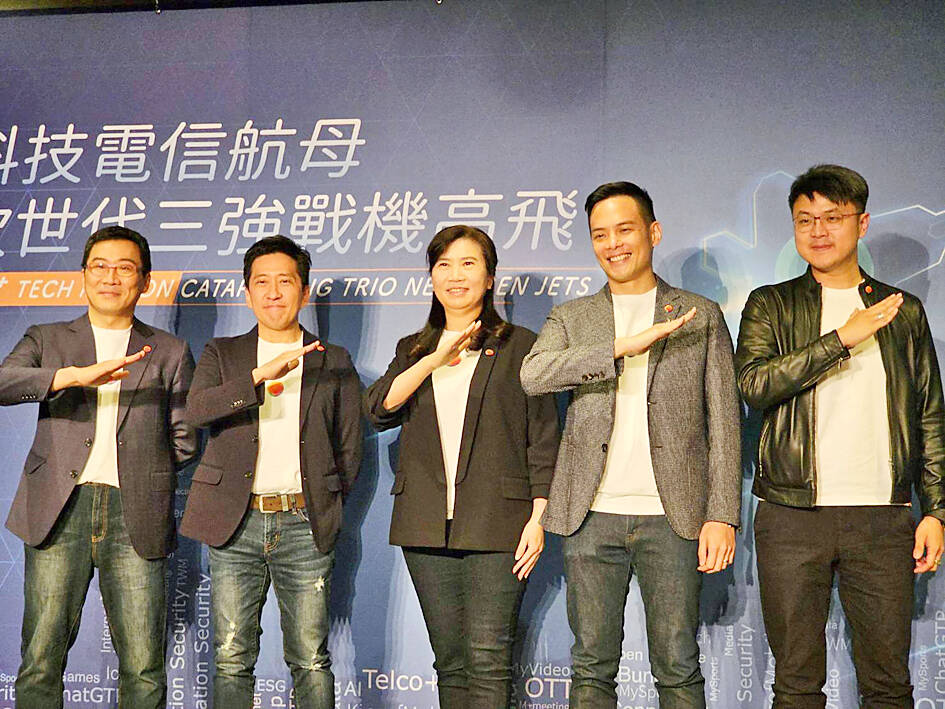Taiwan Mobile Co (台灣大哥大) aims to expand revenue by about 16 percent to about NT$200 billion (US$6.49 billion) this year at the earliest, benefiting from rapidly growing nontraditional services such as financial products, online gaming and its momo coin, it said yesterday.
Last year, Taiwan Mobile’s revenue grew at an annual rate of 10 percent to a record-high NT$172.2 billion after its average revenue per user climbed for eight consecutive quarters to NT$697 during the fourth quarter of last year.
With new products such as “buy now, pay later” services, games and wider usage of momo coins, the company expects to soon reach the NT$200 billion mark, company president Jamie Lin (林之晨) told a news conference in Taipei.

Photo: CNA
Telecom financial services are among the fastest-growing businesses, Lin said.
Taiwan Mobile is seeking to work with partners in the Philippines, Indonesia and Vietnam to expand the usage of its momo coin to the Southeastern Asian countries, where many people do not have bank accounts or credit cards, he said.
Less than 10 percent of people in those countries have a bank account and only 2 to 4 percent of them have a credit card, he said.
The telecom expects a “leapfrog effect” in the emerging countries as they embrace new telecom financial services and skip traditional offerings, which have not taken root yet, he said.
The company has set a medium-to-long term goal to expand its financial services business to NT$10 billion, financial department vice president Vincent Wu (吳建頤) said.
This year, the company aims to expand its user base of momo coins by 10 to 20 percent from 600,000 last year, aided by new services, Wu said.
Last month, the company launched its “buy now, pay later” offerings at e-commerce subsidiary Momo.com Inc (富邦媒體) and is in talks with potential partners to expand the scope of the services beyond Taiwan Mobile subscribers, he said.
Since its launch, the service has attracted more than 3,000 customers, Taiwan Mobile said.
The company said it expects the pay-later services to be available for most local consumers next year.
Online gaming is also a strong growth driver for the company’s revenue, it said.
It last quarter obtained exclusive rights in Taiwan for two new game titles related to the League of Legends franchise.
That helped boost monthly average users by 310 percent year-on-year last quarter and lifted transactions by 346 percent annually, it said.
Contributions from online gaming spiked 1,109 percent last quarter in terms of earnings before interest, taxes, depreciation and amortization from a year earlier, the telecom said.
That forecast did not factor in contributions from Taiwan Star Telecom Co (台灣之星), the acquisition of which is pending approval from the Fair Trade Commission.
Taiwan Mobile hopes to receive approval from the competition watchdog next quarter at the earliest, Lin said.

Nvidia Corp chief executive officer Jensen Huang (黃仁勳) on Monday introduced the company’s latest supercomputer platform, featuring six new chips made by Taiwan Semiconductor Manufacturing Co (TSMC, 台積電), saying that it is now “in full production.” “If Vera Rubin is going to be in time for this year, it must be in production by now, and so, today I can tell you that Vera Rubin is in full production,” Huang said during his keynote speech at CES in Las Vegas. The rollout of six concurrent chips for Vera Rubin — the company’s next-generation artificial intelligence (AI) computing platform — marks a strategic

Enhanced tax credits that have helped reduce the cost of health insurance for the vast majority of US Affordable Care Act enrollees expired on Jan.1, cementing higher health costs for millions of Americans at the start of the new year. Democrats forced a 43-day US government shutdown over the issue. Moderate Republicans called for a solution to save their political aspirations this year. US President Donald Trump floated a way out, only to back off after conservative backlash. In the end, no one’s efforts were enough to save the subsidies before their expiration date. A US House of Representatives vote

REVENUE PERFORMANCE: Cloud and network products, and electronic components saw strong increases, while smart consumer electronics and computing products fell Hon Hai Precision Industry Co (鴻海精密) yesterday posted 26.51 percent quarterly growth in revenue for last quarter to NT$2.6 trillion (US$82.44 billion), the strongest on record for the period and above expectations, but the company forecast a slight revenue dip this quarter due to seasonal factors. On an annual basis, revenue last quarter grew 22.07 percent, the company said. Analysts on average estimated about NT$2.4 trillion increase. Hon Hai, which assembles servers for Nvidia Corp and iPhones for Apple Inc, is expanding its capacity in the US, adding artificial intelligence (AI) server production in Wisconsin and Texas, where it operates established campuses. This

US President Donald Trump on Friday blocked US photonics firm HieFo Corp’s US$3 million acquisition of assets in New Jersey-based aerospace and defense specialist Emcore Corp, citing national security and China-related concerns. In an order released by the White House, Trump said HieFo was “controlled by a citizen of the People’s Republic of China” and that its 2024 acquisition of Emcore’s businesses led the US president to believe that it might “take action that threatens to impair the national security of the United States.” The order did not name the person or detail Trump’s concerns. “The Transaction is hereby prohibited,”